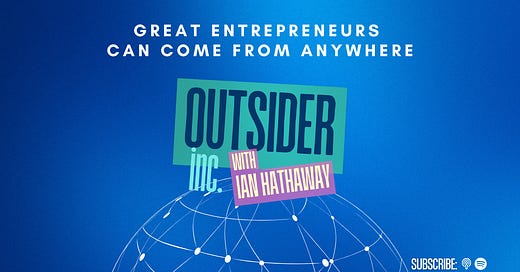I’m thrilled to introduce Outsider Inc., a podcast and newsletter dedicated to visionary leaders breaking the mold of entrepreneurship. Outsider Inc. spotlights entrepreneurs from overlooked places and backgrounds who defied the odds to build generation-defining companies. Through exclusive interviews and insights, we highlight untold stories of hard-earned wisdom, resilience, and lasting impact. Each podcast episode offers fresh perspectives and practical takeaways that inform and inspire—demonstrating that great entrepreneurs can come from anywhere.
What to Expect
Subscribers can expect to receive two new podcast episodes per month to start, with a newsletter in the intervening weeks. I’ll be experimenting with the newsletter format in the beginning, but the initial vision is to provide highlights from podcast episodes as well as news and insights on trends relevant to the platform’s mission.
Podcast guests will typically be founders from outsider backgrounds or places who built—or are building—breakout companies. Guests will also be investors who built a track record backing outsiders, or as outsiders themselves, as well as accomplished professionals in adjacent roles. I’m excited about the amazing roster of early guests we have lined up. Here’s a sampling of what’s to come:
Why This
In 2020, I published The Startup Community Way, a follow-up to my co-author Brad Feld’s wildly successful 2012 book Startup Communities. Before and after its release, I engaged with thousands of people in startup communities around the world. While the core concepts in both books resonated, one thing was missing—more stories that bring these lessons to life and inspire new leaders through tangible examples.
This is my attempt to help fill that gap.
Entrepreneurship relies on outsiders—nonconformists who challenge the status quo and redefine what’s possible. Yet, venture capital—the lifeblood of innovation-driven startups—is an insider’s game. Access is gated by elite networks, institutional biases, and unwritten rules that favor specific founder profiles over others. Great ideas and execution can come from anywhere, but capital remains concentrated in a tight-knit ecosystem that mitigates risk by betting on familiarity. Outsiders succeed despite these barriers, not because the system is designed for them.
At the same time, it is an empirical reality that most venture-backed startup activity—from new seed deals to outlier outcomes—occurs outside the major tech hubs. Most successful founders don’t attend elite universities, nor do they work at prominent tech or professional services firms before starting their companies. Yes, the top tier places and founder personas are disproportionately represented among the top companies, but on an absolute basis, they are not in the majority.
My intention is not to challenge the conventional wisdom—it exists for good reason. But it is also well covered. Instead, I’m focused on raising awareness about a much broader reality that is also worthy of attention. The people behind these improbable successes are fascinating. Their stories are informative and inspiring. I believe the world could benefit from hearing them.
Why Me
I grew up in a small town in Ohio—a place with limited opportunities for dreamers. My dad was a brilliant inventor who envisioned new ways to improve intermodal logistics, securing dozens of patents despite lacking a formal education. But turning inventions of significant scale into commercial success requires access to networks, know-how, and capital—resources he lacked. He was never able to bridge the gap from invention to commercialization because he didn’t understand the game he was playing.
As I built my career in tech entrepreneurship and venture capital, I often wondered: if I knew then what I know now—or if my father had simply been from somewhere else—would the outcome for him have been different? There is no way to know for sure, but his odds would have been better. That question drives my mission today: leveling the playing field to give entrepreneurs like him a better shot at success.
Today, I manage a seed-stage venture capital firm based—in part—on the belief that superior returns can come from backing talented but overlooked entrepreneurs. This strategy works best by pairing capital with hands-on mentorship, a principle I learned at Techstars—the world’s largest and most geographically dispersed pre-seed investor—and through over a decade of working with founders in London and San Francisco.
These experiences and many others in between them—including my own time as a company founder, early-stage operator, and economist who researched and wrote about this subject for many years—have been preparing me for Outsider Inc. for most of my life. I’m excited to get started.
Why Now
After a decade and a half of operating in an easy-money environment, a generation of startup founders—particularly in tech—grew accustomed to capital abundance. Those days are over. Funding is tighter, investors are more selective, and company building requires greater discipline. The shift from rapid growth at all costs to more sustainable execution has left some founders wondering if the startup game is worth pursuing.
History shows this is nothing new. Some of the most successful tech companies were built in even tougher times. Companies like Google and Salesforce emerged from the Dot-Com crash stronger than before. Airbnb and Stripe found ways to scale despite a collapsed market following the Great Financial Crisis. These entrepreneurs didn’t have unlimited capital—they built with grit, resourcefulness, and relentless execution.
On Outsider Inc., founders share raw, first-hand stories of building against the odds—proving that great companies don’t emerge from perfect conditions, but rather, from relentless visionaries who turn obstacles into opportunity. As the tech industry faces a shifting landscape, their hard-won lessons have never been more essential. My hope is that founders building today will be inspired by the belief that they can do it too.
I hope you enjoy listening.
Follow
Follow us on your favorite podcast platform and on social media:
Podcast: Spotify, Apple Podcasts, Amazon Music, iHeart Radio, and others
Social: YouTube, TikTok, Instagram, LinkedIn, X, and BlueSky





Congrats! Psyched you’re doing this 🙌